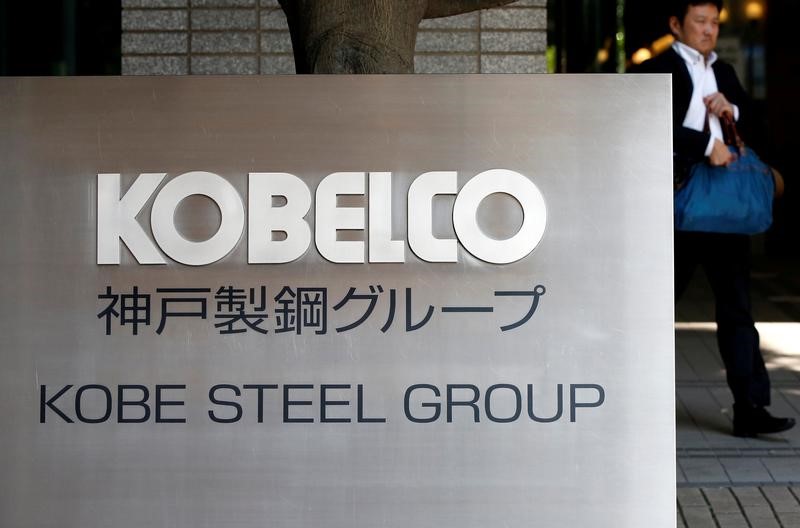By Sam Nussey
TOKYO (Reuters) - Under the once-vaunted "keiretsu" system of close, trust-based ties between manufacturers and suppliers, "Made-in-Japan" became a byword for industrial quality and reliability.
That reputation has eroded over recent years.
Kobe Steel (T:5406) is just the latest in a string of corporate scandals involving data tampering and other methods of cheating to tarnish the Japan Inc quality stamp.
It may be a sign that the government's push to improve corporate governance is seeing greater disclosure of wrongdoing.
But the root cause is more likely that Japanese manufacturers are failing modern compliance standards as they grapple with a shrinking domestic market and increased global competition.
As the focus has shifted to market mechanisms instead of cosy relationship-based arrangements, Japanese manufacturers have had to compete on price and expand their client base.
"Growing global competition has forced Japanese manufacturers to cut costs to be more efficient, while fulfilling a production quota which is often difficult to achieve," said Motokazu Endo, a lawyer at Tokyo Kasumigaseki law office.
The "keiretsu" system was the bedrock of Japan's automotive industry. As the market has become more competition based, those automakers now invest less money in their suppliers and spend less time checking what those suppliers' factories are producing, says Hitoshi Kaise, an auto industry consultant and partner at Roland Berger.
Beyond that, Japan's economy has suffered decades of anaemic growth, bogged down in deflation with its population shrinking and with growing competition from its Asian neighbours.
Those pressures have potentially whittled away at Japanese firms' ability to compete, says Hideaki Miyajima, a Waseda University professor and corporate governance expert.
"GONE TOO FAR"
The list of manufacturer miscreants is long, and growing.
Nissan Motor Co (T:7201) has had to recall every new car it sold in Japan in the last three years after it falsified safety checks.
Both Suzuki Motor Corp (T:7269) and Mitsubishi Motors Corp (T:7211) have faced scandals over fuel economy tests on their vehicles, and there was wrongdoing by the now bankrupt air bag maker Takata, Toyo Tire & Rubber Co (T:5105) and Asahi Kasei Corp (T:3407).
"While focusing on targets was right in the beginning it has gone too far, with companies that can't hit their targets resorting to deception," says Hiroshi Osada, a production quality expert and Bunkyo University professor.
Over the last 15 years compliance rules have become stricter but many Japanese companies have carried on with practices common in the past, says Nobuo Gohara, a lawyer specialising in compliance, who took part in an audit of Olympus Corp (T:7733) after its accounting scandal in 2011.
"There are many of these problems lying dormant on the factory floor," he said.
Japan runs the risk it will "lose out as other Asian economies, including China, progressively raise their standards of quality and reliability," said Professor Thomas Clarke, a corporate governance expert at the University of Technology in Sydney.
BETTER BOARDS
And it's not just dodgy data.
Conglomerate Toshiba Corp (T:6502) is still battling an accounting scandal, and there is a litany of wrongdoing at Tokyo Electric Power Co (TEPCO) (T:9501), the operator of the stricken Fukushima Daiichi nuclear complex.
Just this week, Japan's nuclear regulator said Japan Nuclear Fuel had violated safety rules at its Rokkasho site by fabricating records to say safety checks had been carried out. The plant's start data has been delayed 23 times.
Even when moves are taken to strengthen external monitoring of companies, "it's not possible to conduct checks day in, day out," said Osada at Bunkyo University, who sat on an external panel that audited Toyota during its 2010 recall crisis.
Companies must do more to develop a culture in which workers are able to raise concerns and say 'no' to their bosses, and in which teamwork is used to catch wrongdoing by other employees, Osada added.
More attention should be focused on Japan's board members, who are not active enough in engaging with scandals when they occur, says Shin Ushijima, lawyer and president of the Japan Corporate Governance Network, noting a tendency for companies to be over-reliant on appointing outside panels that are not truly independent.
Corporate governance reforms are having some impact, says Ushijima. At Toshiba, he said, "the board, while not perfect, was improved after it was reshuffled."
